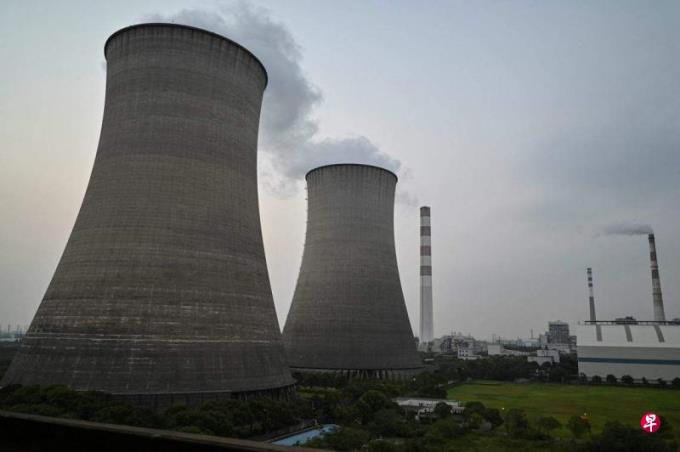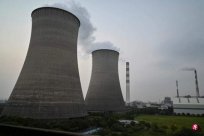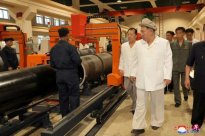
When discussing how to cooperate with China on climatic issues, companies are now easily disturbed by the tension of geopolitics.
The long -term trade war between China and the United States seems to have no end.The strategic raw materials and global influence between the two major powers not only affect each other's trade and diplomatic relations, but also bring extra risks to global companies in all aspects.
The tension between the two countries has inadvertently influenced the company's decision -making in climate issues.
At present, for corporate leaders, the climate is not only risk factor, but climatic response can bring potential growth opportunities.The cutting -edge technology financing of climate -related issues is expected to reach 95 million US dollars (about S $ 13 trillion) by 2030.Whether it is a public institution or a private enterprise, at this time, in the climate issue, it cannot be caught in the election station in geopolitical competition, or the situation of "dare not step on the line" in order to avoid dilemma.
The common destiny of the game of the game
Besides, we are running with time on climate issues.All parties are increasingly aware that everyone should stand on the same front, otherwise they may pay a higher price due to inaction.Billions of people around the world have experienced a partial heating from more than 1.5 degrees Celsius. July this year is the hottest month since recorded.This prompted UN Secretary -General Guterres to warn that the era of warming globe has ended and the era of "global boiling" has arrived.
In addition, the UNFCCC Convention (UNFCCC) recently released the first comprehensive report of "Global Stocktake" that the world has not controlled the global temperature to control the level of the global temperature within 1.5 degrees Celsius before industrialization.The Paris Agreement goals goes on.The report pointed out that as a baseline, companies must prove that they can provide solutions instead of creating more problems; they must formulate strong goals and credible green transformation plans to explain how they will fulfill their promises and in the process of the entire economic transformation processPlay a key role.The "Global Inventory" report states that the complete transformation of the whole economy is necessary, and this can also create huge business opportunities for global companies.
In this context, global companies should be careful not to pursue the so -called "China +1" strategy, that is, consciously transfer investment outside China.This strategy becomes more and more attractive due to the problem of supply chain interruption and the tension between Washington and Beijing.However, if companies copy such strategies in climate cooperation, they will only greatly slow down climate actions.
For example, in terms of clean energy transformation, if you want to expand the scale of some important solutions, China, as the world's leading renewable energy supply country, will be a key puzzle in the large territory.To make breakthroughs in carbon emission reduction, we need to formulate and coordinate the common system and standards. China is the country that countries should not be crowded out in the global value chain.
China's current industrial carbon emissions account for 40 % of global industrial carbon emissions.Iron, steel and aluminum manufacturing are important parts of supporting China's industrial development, but they are also the main sources of emissions.The slower the carbon reduction of these raw materials manufacturing, the higher the cost of relying on their various global business activities.In addition, it is unimaginable to be deduced with the Chinese supply chain.For the "scope three" (scope 3 "(SCOPE 3, editor: Enterprises must disclose the specific category of 15 emission categories, and use the metric tons of carbon dioxide (CO2E) in metrics.Most companies, to ensure that the formation of a complete disclosure strategy in various markets in complex supply chains will become more important.China will be one of the markets that companies cannot ignore.
China has long been the useful and largest supplier of clean energy solutions.As of 2022, it has invested more than 540 billion U.S. dollars in the field of renewable energy, which is three times that of the European Union.However, the development of China's development in this area is smooth. It faces the failure and challenge, and other countries can learn from and learn from it.
For example, some programs promoted by China's industry often fall into the commonly known "Pilot Purgater" due to stagnation at the pilot stage and cannot be large -scale.Data show that nearly 70%of the industrial 4.0 solution cannot get rid of this stage for a long time, so the scale of scale cannot be achieved.If you can successfully overcome this obstacle, it will stimulate enterprises to use those technologies that have potential to fundamentally solve climate problems.
In order to help manufacturers solve this problem, the advanced manufacturing center of the World Economic Forum established the "Global Lighthouse Network" in 2018.manufacturer.This measure can also encourage enterprises to adopt key performance indicators related to sustainable development, including promoting them to reduce greenhouse gas emissions and energy efficiency of 100%.Today, more than one -third of the 132 "lighthouse factories" worldwide (35%) are located in China, and they all show the most advanced use cases of automation and artificial intelligence.
In recent years, due to a large number of foreign personnel flow, some emerging green jobs in the Chinese market are urgent to fill.China has adopted tough control methods when dealing with the crown disease. Now during the economic recovery period, it must extend the tentacles to foreign countries and continue to find suitable talents.It can invest in overseas universities, training and education institutions, etc., playing a greater role in cultivating global green talents, promoting cross -border sharing and exchanges between climate and renewable energy related knowledge and professional technology.
Investment in talents should be two -way.With the new climate plan emerging from the Chinese market, new opportunities will follow.This is the most obvious in the field of electric vehicles.Chinese electric vehicles are now pouring into the European and Southeast Asian markets, and they may also create new employment and learning opportunities for these markets.With Chinese companies taking root and expanding territory overseas, they adopt practical experience in battery technology and market strategies and infrastructure construction, so that those countries that intend to formulate their own electric transportation blueprints can learn from.
The supply chain can not stop carbon reduction
Global companies urgently need to realize that the supply chain built for decades has not only complicated and expensive, but also has no benefit to them.In terms of climating problems, the connection of the current supply chain may even be beneficial, especially because it can promote corporate disclosure and calculation of its "scope three" emissions, which truly achieves the effect of collective decarburization of the supply chain.There is not much time. If an enterprise acts only for self -protection and political interests, it will pay expensive costs.
At the "Summer Davos" summit held in Tianjin in June of this year, Ivera, Director -General of the World Trade Organization, warned that the division of decoupling or supply chain with a country is absolutely unbearable in the world."The summit is also an important milestone in China. It is a positive signal that China has passed to the global business community to show it open the country after three years of crown disease epidemic, and is willing to talk and cooperate with other countries.
China now needs to let the world know that it hopes that it will play a greater role in promoting the climate agenda and defending the open market, so as not to be affected by protectionist emotions, and help to build a global enterprise without the need for international order to choose border stations.
The diplomatic community often says that there are no eternal friends, only eternal interests.It is expected that the climate crisis can become a long -term common interest in various countries.
(The author is the executive director of the regional environmental media and consulting companies Eco-Business and director of ESG Consulting Department, resident in Beijing)




